The Classic Sci-Fi Collection Read online
Page 6
“It shall be my name,” said the Golden One.
Now I look ahead. My future is clear before me. The Saint of the pyre had seen the future when he chose me as his heir, as the heir of all the saints and all the martyrs who came before him and who died for the same cause, for the same word, no matter what name they gave to their cause and their truth.
I shall live here, in my own house. I shall take my food from the earth by the toil of my own hands. I shall learn many secrets from my books. Through the years ahead, I shall rebuild the achievements of the past, and open the way to carry them further, the achievements which are open to me, but closed forever to my brothers, for their minds are shackled to the weakest and dullest ones among them.
I have learned that my power of the sky was known to men long ago; they called it Electricity. It was the power that moved their greatest inventions. It lit this house with light which came from those globes of glass on the walls. I have found the engine which produced this light. I shall learn how to repair it and how to make it work again. I shall learn how to use the wires which carry this power. Then I shall build a barrier of wires around my home, and across the paths which lead to my home; a barrier light as a cobweb, more impassable than a wall of granite; a barrier my brothers will never be able to cross. For they have nothing to fight me with, save the brute force of their numbers. I have my mind.
Then here, on this mountaintop, with the world below me and nothing above me but the sun, I shall live my own truth. Gaea is pregnant with my child. Our son will be raised as a man. He will be taught to say “I” and to bear the pride of it. He will be taught to walk straight and on his own feet. He will be taught reverence for his own spirit.
When I shall have read all the books and learned my new way, when my home will be ready and my earth tilled, I shall steal one day, for the last time, into the cursed City of my birth. I shall call to me my friend who has no name save International 4-8818, and all those like him, Fraternity 2-5503, who cries without reason, and Solidarity 9-6347 who calls for help in the night, and a few others. I shall call to me all the men and the women whose spirit has not been killed within them and who suffer under the yoke of their brothers. They will follow me and I shall lead them to my fortress. And here, in this uncharted wilderness, I and they, my chosen friends, my fellow-builders, shall write the first chapter in the new history of man.
These are the things before me. And as I stand here at the door of glory, I look behind me for the last time. I look upon the history of men, which I have learned from the books, and I wonder. It was a long story, and the spirit which moved it was the spirit of man’s freedom. But what is freedom? Freedom from what? There is nothing to take a man’s freedom away from him, save other men. To be free, a man must be free of his brothers. That is freedom. That and nothing else.
At first, man was enslaved by the gods. But he broke their chains. Then he was enslaved by the kings. But he broke their chains. He was enslaved by his birth, by his kin, by his race. But he broke their chains. He declared to all his brothers that a man has rights which neither god nor king nor other men can take away from him, no matter what their number, for his is the right of man, and there is no right on earth above this right. And he stood on the threshold of the freedom for which the blood of the centuries behind him had been spilled.
But then he gave up all he had won, and fell lower than his savage beginning.
What brought it to pass? What disaster took their reason away from men? What whip lashed them to their knees in shame and submission? The worship of the word “We.”
When men accepted that worship, the structure of centuries collapsed about them, the structure whose every beam had come from the thought of some one man, each in his day down the ages, from the depth of some one spirit, such spirit as existed but for its own sake. Those men who survived those eager to obey, eager to live for one another, since they had nothing else to vindicate them—those men could neither carry on, nor preserve what they had received. Thus did all thought, all science, all wisdom perish on earth. Thus did men—men with nothing to offer save their great number—lost the steel towers, the flying ships, the power wires, all the things they had not created and could never keep. Perhaps, later, some men had been born with the mind and the courage to recover these things which were lost; perhaps these men came before the Councils of Scholars. They were answered as I have been answered—and for the same reasons.
But I still wonder how it was possible, in those graceless years of transition, long ago, that men did not see whither they were going, and went on, in blindness and cowardice, to their fate. I wonder, for it is hard for me to conceive how men who knew the word “I” could give it up and not know what they lost. But such has been the story, for I have lived in the City of the damned, and I know what horror men permitted to be brought upon them.
Perhaps, in those days, there were a few among men, a few of clear sight and clean soul, who refused to surrender that word. What agony must have been theirs before that which they saw coming and could not stop! Perhaps they cried out in protest and in warning. But men paid no heed to their warning. And they, these few, fought a hopeless battle, and they perished with their banners smeared by their own blood. And they chose to perish, for they knew. To them, I send my salute across the centuries, and my pity.
Theirs is the banner in my hand. And I wish I had the power to tell them that the despair of their hearts was not to be final, and their night was not without hope. For the battle they lost can never be lost. For that which they died to save can never perish. Through all the darkness, through all the shame of which men are capable, the spirit of man will remain alive on this earth. It may sleep, but it will awaken. It may wear chains, but it will break through. And man will go on. Man, not men.
Here on this mountain, I and my sons and my chosen friends shall build our new land and our fort. And it will become as the heart of the earth, lost and hidden at first, but beating, beating louder each day. And word of it will reach every corner of the earth. And the roads of the world will become as veins which will carry the best of the world’s blood to my threshold. And all my brothers, and the Councils of my brothers, will hear of it, but they will be impotent against me. And the day will come when I shall break all the chains of the earth, and raze the cities of the enslaved, and my home will become the capital of a world where each man will be free to exist for his own sake.
For the coming of that day shall I fight, I and my sons and my chosen friends. For the freedom of Man. For his rights. For his life. For his honor.
And here, over the portals of my fort, I shall cut in the stone the word which is to be my beacon and my banner. The word which will not die, should we all perish in battle. The word which can never die on this earth, for it is the heart of it and the meaning and the glory.
The sacred word:
EGO
SECOND VARIETY
~
BY PHILIP K. DICK
The claws were bad enough in the first place—nasty, crawling little death-robots. But when they began to imitate their creators, it was time for the human race to make peace—if it could!
The Russian soldier made his way nervously up the ragged side of the hill, holding his gun ready. He glanced around him, licking his dry lips, his face set. From time to time he reached up a gloved hand and wiped perspiration from his neck, pushing down his coat collar.
Eric turned to Corporal Leone. “Want him? Or can I have him?” He adjusted the view sight so the Russian’s features squarely filled the glass, the lines cutting across his hard, somber features.
Leone considered. The Russian was close, moving rapidly, almost running. “Don’t fire. Wait.” Leone tensed. “I don’t think we’re needed.”
The Russian increased his pace, kicking ash and piles of debris out of his way. He reached the top of the hill and stopped, panting, staring around him. The sky was overcast, drifting clouds of gray particles. Bare trunks of trees jutted up occasionally; t
he ground was level and bare, rubble-strewn, with the ruins of buildings standing out here and there like yellowing skulls.
The Russian was uneasy. He knew something was wrong. He started down the hill. Now he was only a few paces from the bunker. Eric was getting fidgety. He played with his pistol, glancing at Leone.
“Don’t worry,” Leone said. “He won’t get here. They’ll take care of him.”
“Are you sure? He’s got damn far.”
“They hang around close to the bunker. He’s getting into the bad part. Get set!”
The Russian began to hurry, sliding down the hill, his boots sinking into the heaps of gray ash, trying to keep his gun up. He stopped for a moment, lifting his fieldglasses to his face.
“He’s looking right at us,” Eric said.
The Russian came on. They could see his eyes, like two blue stones. His mouth was open a little. He needed a shave; his chin was stubbled. On one bony cheek was a square of tape, showing blue at the edge. A fungoid spot. His coat was muddy and torn. One glove was missing. As he ran his belt counter bounced up and down against him.
Leone touched Eric’s arm. “Here one comes.”
Across the ground something small and metallic came, flashing in the dull sunlight of mid-day. A metal sphere. It raced up the hill after the Russian, its treads flying. It was small, one of the baby ones. Its claws were out, two razor projections spinning in a blur of white steel. The Russian heard it. He turned instantly, firing. The sphere dissolved into particles. But already a second had emerged and was following the first. The Russian fired again.
A third sphere leaped up the Russian’s leg, clicking and whirring. It jumped to the shoulder. The spinning blades disappeared into the Russian’s throat.
Eric relaxed. “Well, that’s that. God, those damn things give me the creeps. Sometimes I think we were better off before.”
“If we hadn’t invented them, they would have.” Leone lit a cigarette shakily. “I wonder why a Russian would come all this way alone. I didn’t see anyone covering him.”
Lt. Scott came slipping up the tunnel, into the bunker. “What happened? Something entered the screen.”
“An Ivan.”
“Just one?”
Eric brought the view screen around. Scott peered into it. Now there were numerous metal spheres crawling over the prostrate body, dull metal globes clicking and whirring, sawing up the Russian into small parts to be carried away.
“What a lot of claws,” Scott murmured.
“They come like flies. Not much game for them any more.”
Scott pushed the sight away, disgusted. “Like flies. I wonder why he was out there. They know we have claws all around.”
A larger robot had joined the smaller spheres. It was directing operations, a long blunt tube with projecting eyepieces. There was not much left of the soldier. What remained was being brought down the hillside by the host of claws.
“Sir,” Leone said. “If it’s all right, I’d like to go out there and take a look at him.”
“Why?”
“Maybe he came with something.”
Scott considered. He shrugged. “All right. But be careful.”
“I have my tab.” Leone patted the metal band at his wrist. “I’ll be out of bounds.”
He picked up his rifle and stepped carefully up to the mouth of the bunker, making his way between blocks of concrete and steel prongs, twisted and bent. The air was cold at the top. He crossed over the ground toward the remains of the soldier, striding across the soft ash. A wind blew around him, swirling gray particles up in his face. He squinted and pushed on.
The claws retreated as he came close, some of them stiffening into immobility. He touched his tab. The Ivan would have given something for that! Short hard radiation emitted from the tab neutralized the claws, put them out of commission. Even the big robot with its two waving eyestalks retreated respectfully as he approached.
He bent down over the remains of the soldier. The gloved hand was closed tightly. There was something in it. Leone pried the fingers apart. A sealed container, aluminum. Still shiny.
He put it in his pocket and made his way back to the bunker. Behind him the claws came back to life, moving into operation again. The procession resumed, metal spheres moving through the gray ash with their loads. He could hear their treads scrabbling against the ground. He shuddered.
Scott watched intently as he brought the shiny tube out of his pocket. “He had that?”
“In his hand.” Leone unscrewed the top. “Maybe you should look at it, sir.”
Scott took it. He emptied the contents out in the palm of his hand. A small piece of silk paper, carefully folded. He sat down by the light and unfolded it.
“What’s it say, sir?” Eric said. Several officers came up the tunnel. Major Hendricks appeared.
“Major,” Scott said. “Look at this.”
Hendricks read the slip. “This just come?”
“A single runner. Just now.”
“Where is he?” Hendricks asked sharply.
“The claws got him.”
Major Hendricks grunted. “Here.” He passed it to his companions. “I think this is what we’ve been waiting for. They certainly took their time about it.”
“So they want to talk terms,” Scott said. “Are we going along with them?”
“That’s not for us to decide.” Hendricks sat down. “Where’s the communications officer? I want the Moon Base.”
Leone pondered as the communications officer raised the outside antenna cautiously, scanning the sky above the bunker for any sign of a watching Russian ship.
“Sir,” Scott said to Hendricks. “It’s sure strange they suddenly came around. We’ve been using the claws for almost a year. Now all of a sudden they start to fold.”
“Maybe claws have been getting down in their bunkers.”
“One of the big ones, the kind with stalks, got into an Ivan bunker last week,” Eric said. “It got a whole platoon of them before they got their lid shut.”
“How do you know?”
“A buddy told me. The thing came back with—with remains.”
“Moon Base, sir,” the communications officer said.
On the screen the face of the lunar monitor appeared. His crisp uniform contrasted to the uniforms in the bunker. And he was clean shaven. “Moon Base.”
“This is forward command L-Whistle. On Terra. Let me have General Thompson.”
The monitor faded. Presently General Thompson’s heavy features came into focus. “What is it, Major?”
“Our claws got a single Russian runner with a message. We don’t know whether to act on it—there have been tricks like this in the past.”
“What’s the message?”
“The Russians want us to send a single officer on policy level over to their lines. For a conference. They don’t state the nature of the conference. They say that matters of—” He consulted the slip. “—Matters of grave urgency make it advisable that discussion be opened between a representative of the UN forces and themselves.”
He held the message up to the screen for the general to scan. Thompson’s eyes moved.
“What should we do?” Hendricks said.
“Send a man out.”
“You don’t think it’s a trap?”
“It might be. But the location they give for their forward command is correct. It’s worth a try, at any rate.”
“I’ll send an officer out. And report the results to you as soon as he returns.”
“All right, Major.” Thompson broke the connection. The screen died. Up above, the antenna came slowly down.
Hendricks rolled up the paper, deep in thought.
“I’ll go,” Leone said.
“They want somebody at policy level.” Hendricks rubbed his jaw. “Policy level. I haven’t been outside in months. Maybe I could use a little air.”
“Don’t you think it’s risky?”
Hendricks lifted the view sight and gaz
ed into it. The remains of the Russian were gone. Only a single claw was in sight. It was folding itself back, disappearing into the ash, like a crab. Like some hideous metal crab….
“That’s the only thing that bothers me.” Hendricks rubbed his wrist. “I know I’m safe as long as I have this on me. But there’s something about them. I hate the damn things. I wish we’d never invented them. There’s something wrong with them. Relentless little—”
“If we hadn’t invented them, the Ivans would have.”
Hendricks pushed the sight back. “Anyhow, it seems to be winning the war. I guess that’s good.”
“Sounds like you’re getting the same jitters as the Ivans.” Hendricks examined his wrist watch. “I guess I had better get started, if I want to be there before dark.”
He took a deep breath and then stepped out onto the gray, rubbled ground. After a minute he lit a cigarette and stood gazing around him. The landscape was dead. Nothing stirred. He could see for miles, endless ash and slag, ruins of buildings. A few trees without leaves or branches, only the trunks. Above him the eternal rolling clouds of gray, drifting between Terra and the sun.
Major Hendricks went on. Off to the right something scuttled, something round and metallic. A claw, going lickety-split after something. Probably after a small animal, a rat. They got rats, too. As a sort of sideline.
He came to the top of the little hill and lifted his fieldglasses. The Russian lines were a few miles ahead of him. They had a forward command post there. The runner had come from it.
A squat robot with undulating arms passed by him, its arms weaving inquiringly. The robot went on its way, disappearing under some debris. Hendricks watched it go. He had never seen that type before. There were getting to be more and more types he had never seen, new varieties and sizes coming up from the underground factories.
Hendricks put out his cigarette and hurried on. It was interesting, the use of artificial forms in warfare. How had they got started? Necessity. The Soviet Union had gained great initial success, usual with the side that got the war going. Most of North America had been blasted off the map. Retaliation was quick in coming, of course. The sky was full of circling disc-bombers long before the war began; they had been up there for years. The discs began sailing down all over Russia within hours after Washington got it.

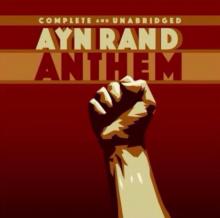 Anthem
Anthem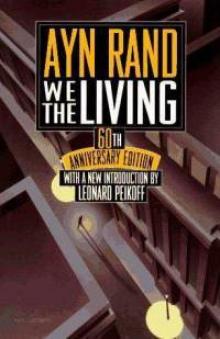 We the Living
We the Living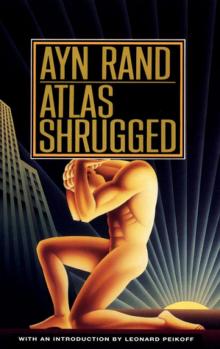 Atlas Shrugged
Atlas Shrugged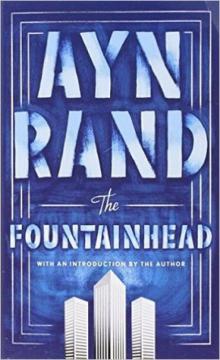 The Fountainhead
The Fountainhead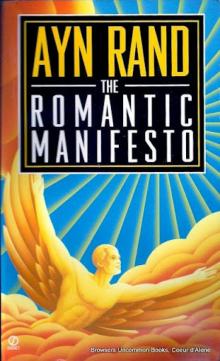 The Romantic Manifesto: A Philosophy of Literature
The Romantic Manifesto: A Philosophy of Literature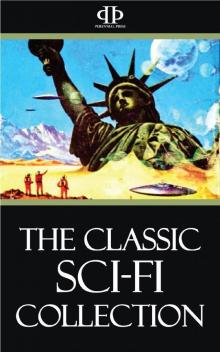 The Classic Sci-Fi Collection
The Classic Sci-Fi Collection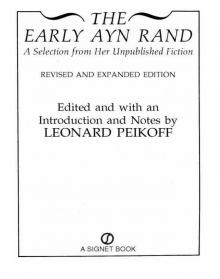 The Early Ayn Rand
The Early Ayn Rand